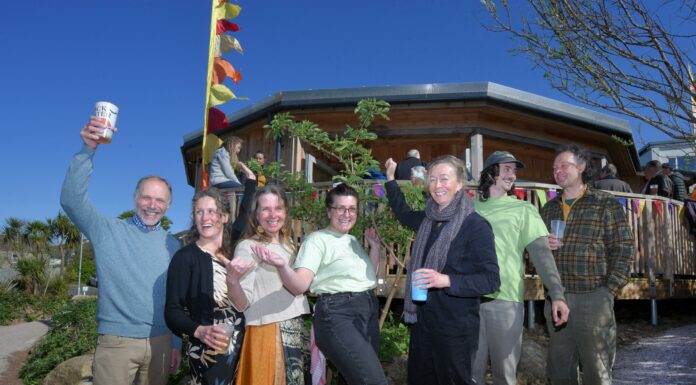Ian Lillicrap, director of Cornish estate agent Lillicrap Chilcott
He might not necessarily thank you for saying it, but Ian Lillicrap is a self-professed anorak! Ever since he was a small boy still in short trousers, he dreamed of becoming an estate agent. He would come down to Truro on family holidays, and stand dreamily outside the Miller & Co offices.
And these dreams came true. Not only did he become an estate agent upon graduating from university, he also ended up spending more than 20 years with Miller.
Since 2001, however, he has been at the helm of his own company, which along with business partner Andrew Chilcott, he has developed into one of Cornwall’s most respected and successful estate agents, which for the past two years has been named Best Estate Agency in Cornwall at the Daily Mail Property Awards.
So without further ado, Business Cornwall doesn’t know many other five or six year olds who want to be estate agents…
(laughs) Very unusual, I agree, but very true. I have no idea why. Maybe we had moved house reasonably often and I became fascinated with the process.
And your boyhood dream came true.
It was actually a little more ironic than that. I remember when I was probably about eight or nine, standing in front of Miller & Co’s offices in Kings Street in Truro when we came down here on holiday, which we did annually, saying that I wanted to work here one day. And that is exactly where I ended up working, which is rather spooky and makes me sound like a real anorak! But to begin with I joined a firm in Leicestershire, Frank Innes, as the tea boy really. But that first six months was an excellent starting point, as I was overhearing everything that went on in the office. I was also seeing a lot of houses, watching valuations and so forth.
And I was very happy there. Then after about six months one of the chaps in the office saw this advertisement in the Estates Gazette for this position at Miller & Co in Cornwall. And they said, here you, why don’t you move down like your folks have. But I thought that would be disloyal, and it took them about four days to encourage me to do it. So I applied, and two weeks later I was working at Miller & Co in Kings Street, Truro. That was in August 1979. I was made a salaried partner of that firm by Geoffrey Miller when I was 23 in 1983, I dealt with the residential agency and set up the firm’s Waterside and Country homes department, which was a big success.
But then Miller & Co was sold to Countrywide in 1990. I vowed I would stay there for about two weeks because I didn’t want to work for a corporate firm, but ended up staying there for another 11 years, and was the deputy managing director.
How come you stayed so long?
Time flies! But you slowly recognise the downside of a corporate environment and realise you are essentially worthless to that company. Once the big chiefs determine someone else could probably do your job for less money, you become highly disposable. The fact that you may have been in the area for so many years means nothing and when they decide to stick a person in the managing director’s role for which I had been groomed for, for the past ten years, you realise they think it’s fun to have an experiment.
So, the moment came when Andrew Chilcott had the good sense to say to me one Friday that we should resign on Monday morning and set up our own firm. Me, having recruited Andrew when he was about 17 ¾ years old. We had always got on really well so that’s what we did!
Absolutely the best thing I have ever done, early in 2001. We established this firm within three weeks of resigning.
How do you go about starting a new firm in just three weeks?
(laughs) That’s a terrible question! That’s just what we were asking ourselves. You have to decide what your firm is going to deal with, where it’s going to be based – and we had to adhere to a radius clause and couldn’t be based within three miles of Truro for a period of six months. You have to decide who your personnel are going to be, what form your advertising is going to take, what your firm’s going to look like, what identity it’s going to have.
You have to buy all the kit, find some offices, deal with all the legislative issues, then deal with all the basic, mundane things – chairs, stationery, things like that. And then you have to get instructed.
Where was your first office?
We chose the Old Chapel in Greenbottom.
Ah! That’s a traditional place for companies who can’t operate in Truro.
Well it is now. No one had ever done that before, so we set a trend! We didn’t want to be seen as Falmouth agent, or a Bodmin agent, or a St Austell agent. We had to be very careful about our choice of location. I drove around the Threemilestone Industrial Estate thinking let’s get completely off the wall, but realised that was one step too far. I remembered that my former solicitor from donkey’s years ago had become a property developer and owned the Old Chapel, just around the corner. So I drove down there and in my headlights saw a ‘To Let’ board and we took it instantly. Great car parking, great access to all the main routes, and no traffic jams! It was heaven on earth, and I have to say we stayed there rather longer than we needed to.
We were in no rush to leave and were fussy about our location in Truro. I came to see this building in Lemon Street, and it wasn’t for sale, just half of the ground floor – it’s a 6,000 sq ft three storey building – was available for rental. But I found out that the top floor were way behind with their rent, the middle floor, half of it was a charity, and the other half a firm of accountants who had just bought a freehold in Truro. And I thought hang on a moment, this isn’t very attractive for the landlord, so instead of renting half of it, we bought the freehold of the whole building.
How has the housing market In Cornwall changed in recent years? Are the rise in house prices the biggest shift?
Prices have risen everywhere. Cornwall has caught up a bit. The reason it was lagging behind other areas in the country is the same reason why maybe properties in some parts of Wales and Scotland lag behind other areas, because they’re relatively inaccessible to the masses. The biggest change I have seen here in the last 30 years is that before, Cornwall was definitely regarded by many people as being too far away. Cornwall has changed from being three counties away, because everyone wanted Hampshire and Dorset, to Devon being the county of choice, to it becoming Cornwall, because of the improved communications.
Also there is the natural progression of the desire of people wanting to move west. And we’re very lucky, because you can’t get any further west than Cornwall.
How have estate agents in Cornwall be faring recently? Have they suffered along with the rest of the country?
No question, very much so, although it perhaps took a little longer to reach Cornwall, which is traditional. We know very well that some firms have had a very awkward time, particularly the large corporates.
Why corporates in particular?
I don’t know, but I can hazard a guess or three. I would imagine they had been pruning back fees to try and win business, which is a fool’s game, because it means you’re operating from the law of diminishing returns. You’re happy to spend money marketing properties knowing full well when you’ve sold them there would barely be enough money coming in to outweigh the money that you’ve spent marketing them.
BC: And how has Lillicrap Chilcott been doing over this time?
We had our best ever year in 2007, which I should imagine a few firms did. But we had a year that we didn’t think we would see the equal of for a long time. But we will equal or beat that this year. Last year we had a drop in turnover of about 18%, and a drop in profit of about 80%, but we were profitable. Halfway through the year we thought we could be facing a loss.
BC: Did you have to let anyone go?
No. We made the conscious decision not to. As we went through last year, we said to ourselves we could be making a half a million pound loss. Could we stomach that and we decided we probably could, once, if we had to. And we decided we wouldn’t make any cuts to our staff or our advertising.
BC: And how is the housing market now? Are house prices back on the way up?
No, I don’t think house prices are rising, but there is a stability of prices, thank goodness. There are quite a few houses still out there in Cornwall with agents, who need their prices lowering. It’s down to the estate agents to be honest with their clients and tell them the truth rather than keeping the bad news from them. Sadly, one of the worst elements of the estate agency business is that in a good market, let alone one that is perceived to be troubled, there are always firms that will go out and over value to try and impress.
All it does is cause the very clued up buyer – and buyers do become very clued up about their sector of the market and understandably – to say ‘nice house, but wrong price’, and they walk away. And what I’ve noticed over the last few years, and people may find this difficult to believe, is a reluctance to barter over the price. They would rather take it on face value. They say I’ve seen a house up for £475k, here’s an offer for £465k. But I don’t call that bartering, that’s just trying to get a bit knocked off the price. What I’m talking about is offering £425k, when the fact is that house should never have been on for more than £435k anyway. That’s the danger, getting the price wrong.
BC: You say the market is still quite slow at the moment…
No, not slow. Slow and flat are two different things. Values are level, but the market isn’t slow. Next year we may well see some base rate increases. Having said that, the lenders have moved away from relating their lending rates to base rates, because base rates are so low. So I don’t think a five-fold rise in base rate, if it were to happen next year, would lead to a fivemove increase in lending rates.
Also to bear in mind next year, there will be a General Election and that will essentially hurt estate agencies for a couple of months, as it provides a distraction.
BC: How do you view the second home market? What proportion of houses do you sell as second homes?
I think the second home market is very small and becoming smaller. We sell at least 50%, if not 60%, of houses to buyers outside of Cornwall, but the vast majority of them are buying them as main homes. That is so different to how it was 30 years ago. Now people want the big move down here. They can take early retirement and more than that, they can move down here in their 30s, 40s and 50s, and operate down here. To be honest I don’t understand how so many can do it, but they do it, and in greater and greater numbers.
And I think it is absolutely outstanding for this county because it is causing so many extra companies to emerge, and Cornwall is all the better for it. In 30 years, no true Cornish vendor has ever instructed me not to offer his house to an out of Cornwall buyer. I’ve had a few vendors who have said to me I’d hate to think my house would be bought as a second home, but they weren’t meaning that they objected to people buying second homes, what they were meaning is I’ve got a lovely garden and I’d hate it to go downhill, or I’ve got a lovely family house and I’d like to think it will be lived in full time. The second homes market is really quite small.
Has the second homes market been affected by the credit crunch?
It was last year, when the likes of Jeremy Paxman and Trevor McDonald were telling you every single day, if you buy a house you’ll only have £65k for every£100k that it’s cost you and that only a lunatic would buy an extra house last year.
And the fact that all the boffins from the lenders and all the economists were pontificating every weekend about how far property values were going to fall, that it was going to be disastrous and take until 2017 to recover…Where on earth did they get dates like that from? Have they got a crystal ball? Are the Mystic Meg?
It was deplorable, and I would say at least half if not three quarters of the problem last year in terms of the credit crunch et al affecting estate agents, was the fact that the newspapers wanted to sell newspapers. They’d lost their Princess Diana story, they’d lost their McCann story from the front page, and the default story became the property story. And they knew full well if they put your home, your mortgage rising, falling whatever on the front page, they would sell newspapers.
And that’s what led to the property market crunch last year, without question. And as I’ve explained to clients many times, if the newspapers put on their front page tomorrow “do not buy eggs” people wouldn’t buy eggs. Nothing wrong with eggs, but people wouldn’t buy them.
How is the buy to let market?
The buy to let market in Cornwall is nothing like the size of the market in many other areas.
I was thinking specifically of the holiday let market.
It isn’t huge. I think holiday letting people have tended to do it as a by product of purchasing, rather than a motivation for purchasing. It is a relatively unusual person who buys a house knowing they are going to be relying 100% on holiday letting to fund it. Such buyers are there, yes, but it doesn’t account for a huge part of the market.
But you drive through some coastal villages in winter, and they’re ghost towns.
You do get that in other parts of Britain as well, not that I’m defending it. It’s not my job to be ambassador of holiday homes. I don’t think you find that in too many villages to be honest. I don’t think you find that even in St Mawes, which is the most notorious example for when that label is attached.
You don’t think some of these holiday homes contribute to the lack of affordable housing for people in Cornwall?
There’s a housing problem in every county in Britain. It is certainly a whole lot easier for a first time buyer to buy in Cornwall than in many of the Home Counties. I know salaries are different, but they’re not all that different. In terms of ability to purchase, it’s down to the determination of a buyer to buy, and the courage to take a mortgage. The solution is available to Government and local councils as it has been for the last 30 years. They can change the situation in an instant, by giving planning consent on green field sites, so the farmers and landowners get an accelerated value for their fields that is way, way above the value of normal agricultural land, but way, way, way below normal developing value.
It’s easy for some MPs to stand on their soapbox and pontificate. If they were a little closer to actually knowing the real movement that takes place, they could be rather more accurate in the statements they make. It is all very well making sound bite statements to grab a headline, but if they’re inaccurate, it’s not really very fair.
Is it becoming any easier to get a mortgage?
A lot of lenders are enthusiastic at the moment in appearing to be willing to lend, and then the underwriters kill off the chance by picking on peculiar little chinks in the armour of the application. The business gatherers at the banks are smiling sweetly to the public, say we want to lend you money, but two or three weeks later when the application gets to the underwriting stage, it’s being terminated. And that’s naughty.







